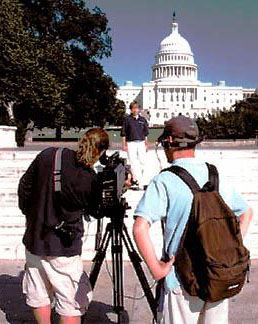For the past 16 years, I’ve woken up on this date, hoping that things would feel different. That it would somehow feel … normal again.
On Sept. 11, 2001, my life changed. All of our lives changed.
As a junior at Robert Morris University and a producer at our student-run campus television station, I remember the frenzy that was the mid-morning of that day. Running up the hill to the station after getting word about the first plane crash. Huddling with my classmates and colleagues around the small TV in our control center as we watched the CNN feed. Heading down the hall to the newsroom to call my anchors to tell them that we were canceling our first week of programming.
Being told to evacuate immediately by a campus security officer while I was on the phone with one of those anchors.
Walking outside into a beautifully sunny Tuesday wondering exactly what I would do next. Feeling lost and confused and scared and clinging to the friendship of my roommates as we watched TV reports until we couldn’t keep our eyes open any longer. I don’t think any of us really got any sleep that night, though.
Going to class the next afternoon and being told by my television production professor that we were going to document what was happening around us.
Leaving campus without permission to go with my little camera crew to the nearby blood bank and interviewing people waiting in line.
Having the (really heavy) camera on my shoulder when a man told us he was telecommuting with a client on the 57th floor of the World Trade Center when the plane hit … and nearly dropping the camera and being at a complete loss for words immediately after hearing that.
Calling my parents that night — Sept. 12 — to tell them that a group of us was heading to Washington D.C. that Saturday … and not fully understanding what that phone call probably did to them emotionally.

Driving to D.C. on Saturday, and walking right up to the gates of the White House. Interviewing more people than I can remember or count. Recording a standup while walking down the steps of the U.S. Capitol … the first on-camera words that would become the introduction to America Talks, the working title of our young documentary. Finally getting into the right traffic line to go to the Pentagon. Arriving at the Pentagon with big plans for filming … and instead being overcome with emotion, recording for a few moments in complete silence before driving away.
It was all so surreal. To be honest, it’s still surreal 16 years later.
As the America Talks project grew, we went on to travel to Shanksville and New York City. (I wrote about our walk through Ground Zero five years ago, and yes, I’m wearing my flag pin again today.)
I keep waiting for the time that I can go through this day without remembering the smell that overwhelmed us when we walked through Ground Zero on that October afternoon and that lingered on everything that we brought back from that trip to New York City.
Today is hard … and I think it will always be hard. And I think it’s even more so this year as we see so many people in Houston and Florida who are dealing with the horrible aftermath of hurricanes; that similar sense of chaos and confusion is once again in the forefront. But as much as I remember the hard times, I also remember my classmates and colleagues that became family as we worked on the America Talks project.
The fact that our work helped lead to the creation of the Center for Documentary Production and Study at Robert Morris University.
The fact that the connections that we made during that class — which became so much more than just a class — have been long-lasting and life-changing.
America Talks is the reason I became a journalist and storyteller. It helped me overcome my fear of interviewing people. It pushed me out of my comfort zone.
It gave me the incredible opportunity to travel back to New York to appear on national television a couple of weeks after the documentary’s release to share our work with millions of viewers on CBS. (Yes, that part is still absolutely surreal, too.)
But, most importantly, it taught me to listen. That’s the one thing that I think we sometimes forget about our documentary. The full title was America Talks, Robert Morris Listens. As much as our project was about collecting stories, it was also about listening and understanding.
And people wanted to be heard. We had people lining up to talk to us just outside of Ground Zero the day that we were were there. These people didn’t know who we were. They didn’t know we were just college kids working on a documentary. They saw we had a camera … and they just wanted to talk. They wanted to be heard. They wanted someone to listen.
Yes, we were just a handful of underclassmen in a video production class. But the work that we did captured a moment in history for posterity. It made a difference.
But it still doesn’t make today feel any closer to normal. I still remember that smell. I still hold back tears when I put my flag pin on every year. I think I probably always will, and I’m guessing I’m not alone in that sentiment.
Much love to my America Talks family, 16 years later. May we never forget … and may we always continue to listen.

0 Comments